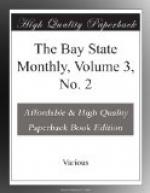The body of the book, consisting of nearly five hundred pages of “verse” by Mr. Wait, is an ingenious elaboration of the principles and forms of this order, especially as it is found held in the Hebraic Roots, throughout the incomparable system of divine revelation. But, indisputably, the treatise would have been far more forcible and impressive if it had been dressed with the direct and vigorous style shown by the author in his preface. Not the least in significance in this remarkable publication is a pocketed chart by Miss Fairchild. But the whole must be perused and pondered in order to give proper impressions of its real value. To the mind of the writer of this brief notice, the book will greatly aid the struggling thought of this manifestly transitional era, in that it points so distinctly to the oncoming theological science that is to effect a complete revolution in prevailing conceptions of creative order.
W.H.K.
* * * * *
PHILOSOPHIAE QUESTOR: or Days in Concord. By JULIA R. ANAGNOS. Boston: D. Lothrop and Company.
This is a little book—only sixty pages—but it is entirely unique in its plan and style. Its purpose is to give an outline sketch of two seasons of the School of Philosophy. To secure this purpose, the author has taken as “a sort of half heroine the shadowy figure of a young girl;” and, as seen to her, the proceedings of the school are sketched. Most of the persons and places have fictitious names; Mr. Alcott is called “Venerablis;” Concord, “Harmony;” the school, “the Acadame.” Mr. Emerson retains his real name; the girl, who observes and writes, is “Eudoxia.”
One who opens the book will be apt to read it through, not as much for its real value as for its quaint style and sometimes beautiful expressions.
* * * * *
EDITOR’S TABLE.
Of all the nearly two-score states together forming the American Union, no one surpasses the Commonwealth of Massachusetts in the extent and variety of her historical resources. Two hundred and sixty-five years ago the Mayflower and her companion craft sighted the rock-bound coast of New England as they sailed into Massachusetts Bay. That event marks the beginning of a history which, to us of the present generation, stands unequalled in the richness of its coloring. While the history of the Colonial period is cold and unpoetic in many of its aspects, it also contains an element of romance not to be overlooked. Truly, it is not the romance of ancient Rome, nor of the castle-bordered Rhine, nor of Merrie Old England; it is a romance growing out of a life in a new world; a life attended—almost made up, even, of conflicts with a strange race of savage people, and conflicts with hunger, cold, and sometimes famine. The events of this early Colonial life, tragic as they often are, carry with them an interest which is almost enchanting.




